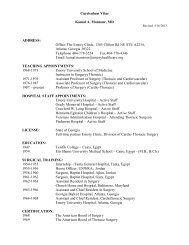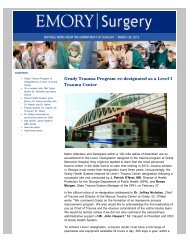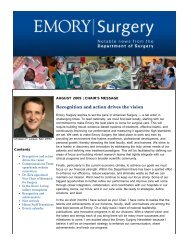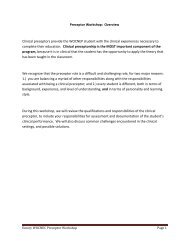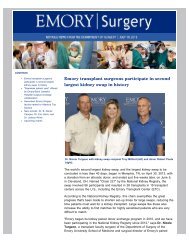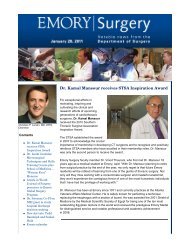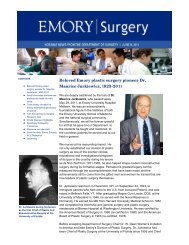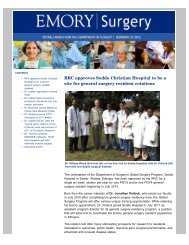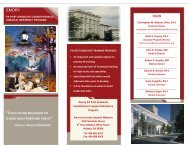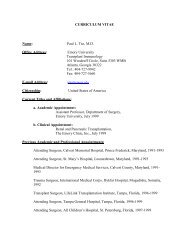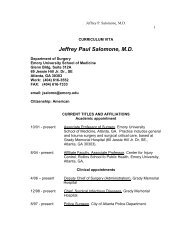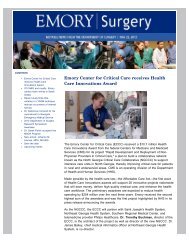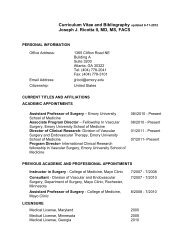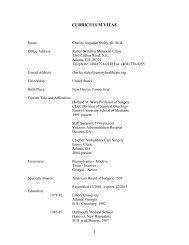Robert S. Mittler - Department of Surgery - Emory University
Robert S. Mittler - Department of Surgery - Emory University
Robert S. Mittler - Department of Surgery - Emory University
You also want an ePaper? Increase the reach of your titles
YUMPU automatically turns print PDFs into web optimized ePapers that Google loves.
INVITED SPEAKER:<br />
1990 New York Medical College, <strong>Department</strong> <strong>of</strong> Microbiology and Immunology, Valhalla NY<br />
1993 Seattle Biomedical Research Institute, Seattle, WA<br />
1994 <strong>Robert</strong> W. Franz Cancer Research Center, Earle A Chiles Research Institute, Providence<br />
Portland Medical Center, Portland, OR<br />
1997 Cambridge <strong>University</strong>, Conference on Mucins and Tumor Immunology, Cambridge,<br />
England<br />
1999 Oregon State <strong>University</strong>, <strong>Department</strong> <strong>of</strong> Microbiology and Immunology, Corvallis, OR<br />
2001 Leiden <strong>University</strong> Health Sciences Center, <strong>Department</strong> <strong>of</strong> Hematology and Tumor<br />
Immunology<br />
2001 Northwest Research Institute, <strong>Department</strong> <strong>of</strong> Immunology, Seattle, WA<br />
2002 <strong>University</strong> <strong>of</strong> Seoul, Fourth Annual Immunology Meeting, Seoul, South Korea<br />
2002 Ulsan <strong>University</strong>, <strong>Department</strong> <strong>of</strong> Immunology, Ulsan, South Korea<br />
2003 Memorial Sloan-Kettering Cancer Center, New York, NY<br />
2003 Cornell <strong>University</strong> School <strong>of</strong> Medicine, New York, NY<br />
2003 <strong>University</strong> <strong>of</strong> Connecticut Health Sciences Center, <strong>Department</strong> <strong>of</strong> Immunology,<br />
Farmington, CT.<br />
2005 Crossroads between Innate and Adaptive Immunity Conference, Rhodes, Greece.<br />
2005 H. Lee M<strong>of</strong>fitt Cancer Center, <strong>University</strong> <strong>of</strong> South Florida.<br />
2005 American Congress Of Rheumatology – Annual Meeting, San Diego CA.<br />
2006 Symposium for Cell and Gene Therapy, Martin Luther <strong>University</strong> Hospital, Halle-<br />
Wittenburg, Germany.<br />
2006 La Jolla Institute for Allergy and Immunology, San Diego CA.<br />
2008 <strong>University</strong> <strong>of</strong> Miami School <strong>of</strong> Medicine, Miami, FL.<br />
2008 <strong>University</strong> <strong>of</strong> Ulsan, Ulsan, South Korea<br />
2008 The NIH Rocky Mountain National Laboratory<br />
RESEARCH FOCUS:<br />
Our research interests center on the CD137 (TNFRSF9 – 4-1BB) T cell costimulatory receptor,<br />
a member <strong>of</strong> the TNFR superfamily and how it functions in regulating the immune system - with<br />
emphasis on enhancing the induction <strong>of</strong> anti-viral and anti-tumor immunity, and the suppression<br />
<strong>of</strong> autoimmunity. CD137 receptors are activation-induced on T cells, NK cells, NKT cells,<br />
granulocytes, macrophages and dendritic cells. CD137 is constitutively expressed on<br />
neutrophils, and in humans it can be expressed on neurons, astrocytes and microglia. On T<br />
cells CD137 can serve as a costimulatory receptor, the crosslinking <strong>of</strong> which upregulates antiapoptotic<br />
survival signals. The ligand for CD137, 4-1BBL, a member <strong>of</strong> the TNF superfamily is<br />
weakly expressed on B cells but is upregulated upon B cell activation. Its expression is also<br />
upregulated on other pr<strong>of</strong>essional antigen-presenting cells (APCs) after activation or<br />
maturation. We have found that although CD137 is expressed on activated CD4 and CD8<br />
positive T cells, anti-CD137 mediated signaling preferentially upregulates CD8 + T cell function<br />
and survival in vitro and in vivo. We have also found that CD137 ligands induce the eradication<br />
<strong>of</strong> established poorly immunogenic tumors and reverse established autoimmune diseases such<br />
as rheumatoid arthritis and systemic lupus erythematosis. Recently we have found that the<br />
timing <strong>of</strong> anti-CD137 mAb treatment relative to a viral infection has either an<br />
immunosuppressive effect, or an immune enhancing effect. This observation is critical to the<br />
clinical use <strong>of</strong> anti-CD137 mAbs that are currently in Phase II clinical trials to treat melanoma<br />
and ovarian cancer and may be used as vaccine adjuvants for treating infectious diseases. In<br />
addition to these studies our lab is focused on the following objectives: (1) Our recent studies<br />
have led us to the hypothesis that CD137 functions in part by maintaining the survival or<br />
function <strong>of</strong> regulatory T cells in mammals. These T cells play a critical role in the suppression <strong>of</strong><br />
4



